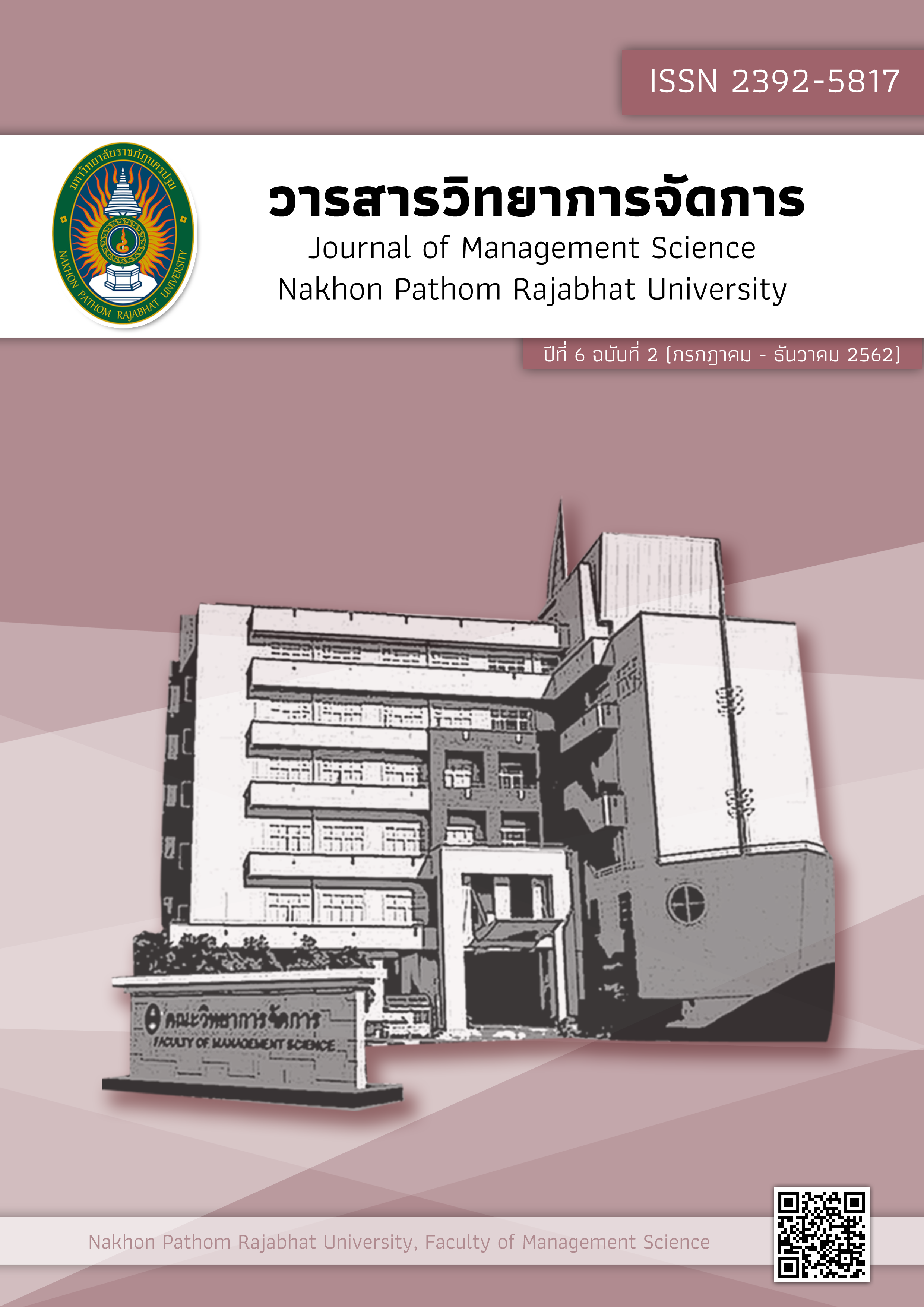Relationship between Spiritual Intelligence and Competencies of Thai Professional Accountants
Main Article Content
Abstract
The purpose of this research is to study the relationship between spiritual intelligence and competencies of Thai professional accountants, Questionnaires data were collected from 401 Thai professional accountants who attended the training with the Federation of Accounting Professions by random and convenience sampling. This research used partial least squares structural equation modeling (PLS-SEM) to analyze the relationship between spiritual intelligence and competencies of Thai professional accountants through the mediating role of self-efficacy and job satisfaction. The results showed that spiritual intelligence has a relationship with competencies of Thai professional accountants, which can be explained by the role of self-efficacy and job satisfaction. Moreover, the analysis supported a positive relationship between competencies of Thai professional accountants and job performance. All results are statistically significant at the 0.01 level
Article history : Received 8 August 2019
Revised 26 November 2019
Accepted 28 November 2019
SIMILARITY INDEX = 0.00
Article Details
The views and opinions of the article appearing in this journal are those of the author. It is not considered a view and responsibility of the editorial staff.
References
ณัฐชา วัฒนวิไช และจุฑามน สิทธิผลวนิชกุล. (2555). การพัฒนาศักยภาพวิชาชีพบัญชีไทยเมื่อเปิดเสรีทางเศรษฐกิจ. วารสารนักบริหาร, 32(3), 16-25.
ปัญจพร ศรีชนาพันธ์ วรพรรณ เขียวรุจี และปวีณา ศิริภัณฑ์. (2558). ปัจจัยที่ส่งผลต่อปัญหาในการจัดทำบัญชีกองทุนหมู่บ้าน ในเขตอำเภอเมือง จังหวัดลำปาง. วารสารการวิจัยเพื่อพัฒนาชุมชน (มนุษย์ศาสตร์และสังคมศาสตร์), 8(2), 88-97.
พิมพ์พิศา วรรณวิจิตร และปวีนา กองจันทร. (2560). ปัจจัยที่ส่งผลต่อประสิทธิภาพการจัดทำบัญชีของกลุ่มออมทรัพย์เพื่อการผลิตในจังหวัดมหาสารคาม. Veridian E-Journal, Silpakorn University, 10(1), 1926-1942.
ลลิตา แว่นแก้ว ญาณินท์ ตั้งภิญโญพุฒิคุณ และไตรรงค์ สวัสดิกุล. (2558). ความสัมพันธ์ระหว่างคุณสมบัติทางการบัญชีที่ดีกับคุณภาพการทำงานของผู้ทำบัญชีในจังหวัดขอนแก่น. วารสารมนุษศาสตร์และสังคมศาสตร์ มหาวิทยาลัยมหาสารคาม, 34(2), 155-163.
สภาวิชาชีพบัญชี ในพระบรมราชูปถัมภ์. (2550). มาตรฐานการศึกษาระหว่างประเทศสำหรับนักวิชาชีพบัญชี [ออนไลน์]. ค้นเมื่อ 10 กันยายน 2557 จาก https:// nntworld.prd.go.th/royalnews/home. php?id1185
สันสกฤต วิจิตรเลขการ. (2549). International Education Standards (IES) กับวิชาชีพบัญชีในประเทศไทย. จุลสารสมาคมการบัญชีไทย, 3(1), 25-28.
สมศรี เวิ่นทอง และปริญญา มากลิ่น. (2562). เชาวน์จิตอัจฉริยะ : แนวคิดการสร้างความสมดุลผู้ประกอบวิชาชีพบัญชี. เอกสารประกอบการประชุมวิชาการระดับชาติ ครั้งที่ 11 มหาวิทยาลัยราชภัฎนครปฐม, 11(1), 140-141.
สุรพงษ์ นิ่มเกิด, อดิลล่า พงศ์ยี่หล้า และจรัญญา ปานเจิรญ. (2555). ความสัมพันธ์ระหว่างความสุขกับผลการปฏิบัติงานของพนักงานบริษัทที่จดทะเบียนในตลาดหลักทรัพย์ เอ็ม เอ ไอ. วารสารดุษฏีบัณฑิตทางสังคมศาสตร์(ฉบับมนุษยศาสตร์และสังคมศาสตร์) มหาวิทยาลัยธุรกิจบัณฑิตย์, 2 (2), 6-20.
อภิญญา อิงอาจ และชลธร อริยปิติพันธ์. (2553). การรับรู้ความสามารถของตนด้านการเรียนและความสามารถในการฟันฝ่าอุปสรรคของนักศึกษา. วารสารวิชาการมหาวิทยาลัยกรุงเทพ, 9(1), 30-43.
Bandura, A. (1997). The anatomy of stages of change. American Journal of Health Promotion, 12(1), 8-10.
Cammann, C., Fichman, M., Jenkins, G. D., & Klesh, J. (1983). Michigan Organizational Assessment Questionnaire. In S. E. Seashore, E.E. Lawler, P. H. Mirvis, & C. Cammann (eds.), assessing organizational change: A guide to methods, measures, and practices (71–138). New York: Wiley-Interscience.
Charoensukmongkol, P. (2017). Superstitious Behaviors and Perceived Job Performance of Internal Auditing Staffs in Thailand. Thammasat Review, 20(2), 18-38.
Cook,S., Macaulay,S., & Coldicott,H. (2004). Change Management Excellence (4-16), London: Kogan Page.
Efron, B., Hastie, T., Johnstone, I. and Tibshirani, R. (2004) Least angle regression. Annuals of Statistics, 32(2), 407–451.
Fornell, C., and Larcker, D. F. (1981). Evaluating Structural Equation Models with Unobservable Variables and Measurement Error. Journal of Marketing Research, 18(1), 39-50.
Gieseke, A.R. (2014). The Relationship between Spiritual Intelligence, Mindfulness, and Transpormational Leadersip Among Public Higher Education Leaders. Doctoral Dissertation of Education Northeastern University.
Hair, J. F., Black, W. C., Babin, B. J., & Anderson, R.E. (2009). Multivariate data analysis. Upper Saddle River, NJ: Prentice Hall.
Hassan,J. (2013). Role of Spiritual Intelligence of Rehabilitated and Normal Adolescents in Developing Emotional Intelligence, Adjustment and Locus of Control. Doctoral Dissertation of Philosophy in Psychology Dravidian University.
Henseler, J., Hubona, G. & Ray, P. A. (2016). Using PLS Path Modeling in New Technology Research: updated guidelines. Industrial Management & Data Systems, 116(1), 2-20.
Hosseini,M., Elias,H., Krauss,S.E., & Aishah,S. (2010). A Review Study on Spiritual Intelligence, Adolescence and Spiritual Intelligence, Factors that may contribute to Individual Differences in Spiritual Intelligence and the Related Theories. Journal of Social Sciences, 2(2), 429-438.
King,D.B. (2008). Rethinking Claims of Spiritual Intelligence: A Definition, Model, and Measure. Master of Science Trent University.
Kock, N. (2019). WarpPLS 6.0 User Manual. Laredo, TX: ScriptWarp Systems.
Krishnan, R., Loon, K. W., & Tan, N. Z. (2018). The Effects of Job Satisfaction and Work-Life Balance on Employee Task Performance. International Journal of Academic Research in Business and Social Sciences, 8(3), 652-663.
Marghzar.S.H. & Marzban. A. (2018). The Relationship between Spiritual Intelligence and Efficacy among Iranian EFL Teachers. Theory and Practice in Language Studies, 18(1), 67-73.
Rashvand,O.,& Bahrevar,E. (2013). A Study of the Relationship among Spiritual intelligence, Organizational Citizenship Behavior and Turnover Intentions. Journal of Organizational Behavior and Human Resource Managemnt, 1(2), 25-34.
Rani,A.A, Abidin,I., & Ab Hamid, M.R. (2013). The Impact of Spiritual Intelligence on Work Performance: Case studies in Government Hospitals of East Coast of Malaysia. Journal of Global Macro Trends, 2(3), 46-59.
Safaeian,M. & Esmaeilinasab, M. (2014). Comparison of spiritual intelligence, job stress and coping styles between nurses and doctors. Journal of Environment and Life Sciences 3(2), 233-237.
Schwarzer, R., & Jerusalem, M. (1995). Generalized Self-Efficacy scale. In J. Weinman, S. Wright, & M. Johnston, Measures in health psychology: A user’s portfolio Causal and control beliefs (35-37). Windsor, UK: NFER-NELSON.
Zohar, D., & Marshall, I. (2000). Spiritual Intelligence - The Ultimate Intelligence (3-8), London: Bloomsbury Publishing Plc.

